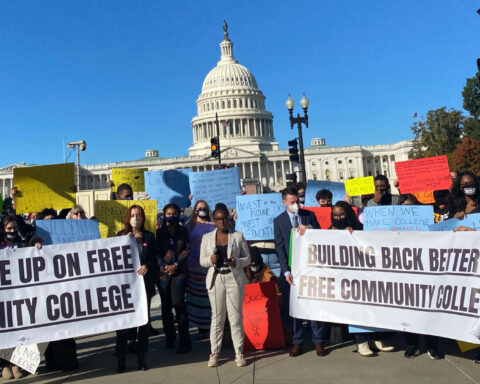By Matthew Arrojas
Democrats are making another push to increase the maximum Pell Grant award as the 2024 election season heats up.
Thirty-three senators and 28 members of the House of Representatives co-introduced the Pell Grant Preservation and Expansion Act on Thursday. The bill, among other things, would nearly double the maximum Pell Grant award and tie future funding to inflation to ensure the grant for low- and middle-income college students retains its purchasing power.
This proposal would also open the program to Deferred Action for Childhood Arrivals (DACA) recipients, commonly referred to as Dreamers.
“The Pell Grant is the cornerstone of our federal financial aid programs. But over the years, the grant has covered a shrinking percentage of the actual cost of college, requiring students to take on more debt or, even worse, not continue their education,” Sen. Jack Reed of Rhode Island said in a statement. “This legislation would help expand access to Pell Grants, lower student debt, strengthen our workforce and economy, and help deserving students achieve their full potential.”
Steady Pell Grant Increases Proposed
Currently, the maximum Pell Grant award for the 2024-25 academic year is $7,395. The Pell Grant Preservation and Expansion Act would increase that steadily over the next six years:
| Academic Year | Proposed Maximum Pell Grant |
|---|---|
| 2024-25 | $7,395 |
| 2025-26 | $10,000 |
| 2026-27 | $11,000 |
| 2027-28 | $12,000 |
| 2028-29 | $13,000 |
| 2029-30 | $14,000 |
Under this proposal, the maximum Pell Grant award would continue to grow automatically in 2030-31 and beyond. The award would grow by a percentage equal to any increase in the Consumer Price Index in the most recent year, rounded to the nearest $50.
Advocates and lawmakers — including President Joe Biden — have long called for substantial Pell Grant increases. A BestColleges analysis found that after considering inflation, the average Pell Grant award decreased by 1% between 2011 and 2021.
Proposal to Ensure Future Funding
The Pell Grant program currently relies on a mix of mandatory and discretionary funding.
Most of the funds come from discretionary funding, which Congress must approve each year. This makes the program liable to a potential shortfall. If this happens, students who would typically qualify for a Pell Grant may receive nothing or a smaller award than expected.
This recent proposal would amend the program to make all Pell Grants come from a mandatory funding pool.
If this proposal passes, the program would no longer be at risk of underfunding.
Earlier this year, the Committee for a Responsible Budget projected a Pell Grant funding shortfall by 2026 or sooner. The Congressional Budget Office (CBO) now anticipates, however, that there will be no immediate shortfall due to a sharp downturn in the number of financial aid applications resulting from the rocky rollout of the new FAFSA application this year.
In 2011, Congress decreased the maximum number of semesters students could benefit from the Pell Grant from 18 semesters to 12 in response to a funding shortfall. The Pell Grant Preservation and Expansion Act would reverse this change and allow students to access Pell for up to 18 semesters once again.
Expanded Pell Grant Access to Undocumented Students
Democrats’ Pell Grant proposal would also expand access to so-called Dreamers.
Dreamers are students who were brought to the U.S. illegally as children but can enjoy some of the same benefits as U.S. citizens through the DACA program. Of the 408,000 estimated undocumented college students in the U.S., the Presidents’ Alliance on Higher Education and Immigration estimates that approximately 181,000 are DACA-eligible. The rest are not eligible because they were brought to the U.S. after June 15, 2007.
The Pell Grant Preservation and Expansion Act would allow these students to receive Pell Grants.
That would be a significant change. Currently, undocumented students are not able to access federal financial aid. Only some states allow Dreamers to access state financial aid, leaving these students with few options to fund their pursuit of a degree or certification.
The proposal wouldn’t just expand Pell access to Dreamers, however.
It would also expand access to immigrants who would be DACA-eligible if the program had not been suspended. That means people who came to the U.S. as children after June 15, 2007, would presumably also be able to receive a Pell Grant.





